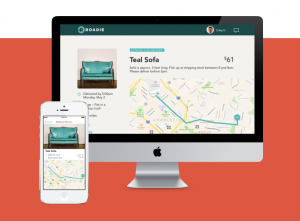Roadie is creating a wide last-mile delivery network in the US by using excess capacity already on the road. MH&L talked with Marc Golin, founder, and CEO of Roadie. Marc was remodeling a property and couldn’t get the part he needed for a number of days. Driving along the freeway it occurred to him that all of these cars traveling his direction had backseats and trunks that could easily carry his part.
“And that’s when it hit me,” says Marc Gorlin to MH&L. “Why not find a way to get to that capacity.” Every day, 250 million passenger vehicles hit the road with 4 billion cubic feet of excess capacity, says Golin. “A crowdsourcing model could connect those drivers with people who need things delivered.” So he created a company in 2014 and an app to do just that.
Today, Roadie has over 150,000 drivers. These drivers, which are screened and certified but not employed by Roadie, have delivered products to more than 11,000 cities and towns, covering 89% of all US households, often same day. Retailers like Walmart, Macy’s and Home Depot and manufacturing companies like Nissan and UPS are all clients of Roadie.
Firms like Roadie are proliferating. Rappi operates in 57 cities in Latin America. A Filipino firm, Jojo, does so in Manila, the capital, and a nearby province. Many of the senders are companies. Amazon’s quick and cheap deliveries are forcing others to up their game, says Ravi Shanker of Morgan Stanley, a bank. Corporate fleets and logistics giants like FedEx will dominate long-haul routes. But by tapping into people’s movements, firms can withstand spikes in demand and save money on the last mile, often the costliest leg of a parcel’s journey.
Other crowd shipping startups are eyeing free space inside travelers’ suitcases. PiggyBee and Grabr, operate worldwide, linking consumers desirous of products only available overseas with international passengers headed their way.

